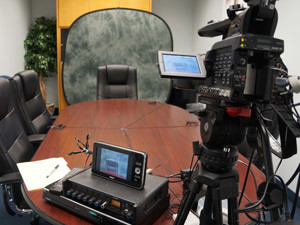Expert Legal Videography Services for Courtroom Needs.
Expert Legal Videography Services for Courtroom Needs.
Blog Article
The Duty of Lawful Videography in Depositions and Trials
Legal videography has emerged as a vital tool in both depositions and trials, offering a multifaceted approach to recording witness statements. As lawful specialists significantly acknowledge its worth, it triggers a deeper exam of just how these aesthetic records can affect juror understandings and test end results.
Value of Legal Videography
Legal videography plays a critical function in the paperwork and presentation of depositions and trials. This customized field combines technological abilities with legal expertise to develop a reliable record of proceedings that can significantly affect instance results. The appearance of legal videography enhances the understanding of witness testament, permitting jurors and courts to observe not just the spoken words but also the disposition, emotions, and body movement of the witnesses.

The relevance of lawful videography prolongs beyond the courtroom; it also plays a vital duty in protecting evidence for future reference, whether for allures or additional lawsuit. Therefore, its combination into the lawful procedure is vital for guaranteeing a fair and exact representation of the facts, eventually contributing to the search of justice.

Process of Legal Videography
While catching the subtleties of depositions and tests, the process of lawful videography includes numerous critical steps that make sure top notch, exact recordings. A specialist legal videographer prepares by assessing the case products and understanding the details requirements of the deposition or test. This preparation includes familiarizing themselves with the participants and the context, which helps in capturing significant details.
On the day of the recording, the videographer establishes up the required tools, which generally consists of high-def video cameras, microphones, and correct illumination. Making sure ideal angles and audio high quality is vital, as it directly affects the performance of the recording. The videographer communicates with attorneys and individuals to develop protocols, guaranteeing that every person recognizes the recording procedure.
During the deposition or trial, the videographer diligently tapes the proceedings, paying close focus to both spoken and non-verbal cues. legal videography. This includes catching the attitude and responses of witnesses and attorneys. After the session concludes, the videographer may modify the video footage for clearness and compliance with lawful standards, generating a last product that accurately shows the proceedings for future reference and usage in legal contexts
Benefits in Depositions
The unification of videography in depositions uses various benefits that boost the total procedure of collecting evidence. One key advantage is the capability to capture witness statements with aesthetic and auditory integrity, offering a more precise depiction of the witness's disposition, tone, and body movement. This multidimensional technique enables lawyers and juries to evaluate integrity a lot more properly than standard written transcripts alone.
Furthermore, videographed depositions act as a powerful device for preserving testament. Ought to a witness come to be unavailable for test, their recorded deposition can be played in court, making sure that their evidence stays accessible and appropriate. This facet considerably lowers the threat of shedding crucial information that might affect instance results.
In addition, making use of legal videography advertises far better preparation for lawyers. Assessing video clip footage permits legal teams to evaluate and improve their strategies, identifying toughness and weaknesses in their situations. This primary benefit can bring about more compelling presentations in court.
Finally, videography boosts the total professionalism and trust of the deposition procedure, instilling confidence in clients concerning the thoroughness of their legal representation. By leveraging innovation, attorneys can significantly improve Bonuses the effectiveness of depositions.
Effect On Trials
In numerous trials, the combination of videography can substantially affect the discussion of proof and the court's understanding. Lawful videography catches witness statements and important proof in a vibrant style, enabling jurors to engage with the product on numerous degrees. This visual component enhances the narration facet of a test, supplying context and psychological resonance that conventional text-based evidence might do not have.
Additionally, video recordings can function as powerful tools for impeachment during interrogation. When disparities develop between a important site witness's prior declarations and their court statement, video proof supplies an objective reference that can guide jurors' point of views. This immediacy and clarity can strengthen the integrity of a celebration's narrative while concurrently undermining opposing debates.
Furthermore, the use of videography can help enhance complicated information, making it extra available to jurors who might battle to comprehend intricate information provided only with verbal testament. By combining visuals with acoustic information, lawful videography can enhance retention and understanding, inevitably influencing the court's decision-making process. Therefore, the effect of videography in trials prolongs past simple aesthetics; it plays a critical function in forming the legal landscape and results.
Future Trends in Legal Videography
As we look toward the future of lawful videography, several emerging patterns assure to reshape its function within the court room. One significant pattern is the useful site combination of artificial intelligence (AI) in video clip evaluation and editing - legal videography. AI can enhance the procedure of identifying essential moments in videotaped depositions, allowing attorneys to rapidly access pertinent web content, therefore boosting performance in case preparation
Furthermore, the increase of digital fact (VR) and augmented truth (AR) innovations is anticipated to change just how jurors experience proof. By submersing jurors in a simulated atmosphere, these innovations can supply an extra extensive understanding of intricate circumstances, leading to more informed deliberations.

In addition, the increasing need for remote depositions, increased by the COVID-19 pandemic, will likely proceed. Lawful videographers will need to adapt to brand-new software program and systems to make sure high-grade recordings in digital setups.
Finally, the growing focus on information safety will necessitate stricter protocols for saving and sharing video clip evidence. As the legal landscape evolves, lawful videographers need to stay abreast of these trends to keep their importance and efficiency in the judicial process.

Conclusion
In recap, legal videography serves a critical function in the judicial process, improving the stability of depositions and tests. As technology continues to develop, lawful videography is positioned to more change its role within the legal landscape.
Report this page